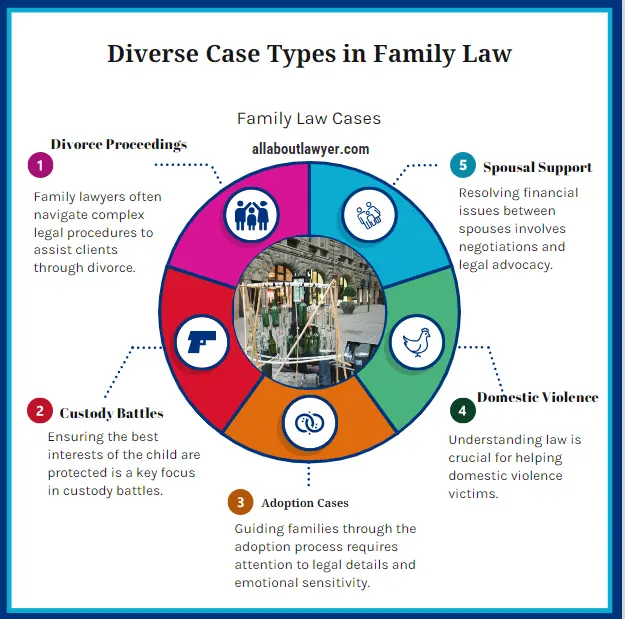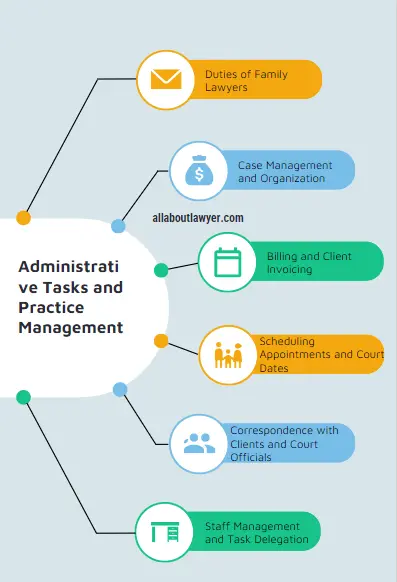What Do Family Lawyers Do on a Daily Basis?
Family lawyers in the United States engage in a wide range of responsibilities, addressing some of the most sensitive and complex legal issues faced by individuals and families. Their day-to-day work involves legal acumen, strong interpersonal skills, and a dedication to guiding clients through difficult transitions. In this article, we will tell you what do family lawyers do on a daily basis in the US or any part of the world.
Table of Contents
A Day in the Life of a Family Lawyer
The life of a family lawyer is a dynamic blend of legal expertise, emotional intelligence, and commitment to clients dealing with life’s most complex challenges. A typical day involves a multifaceted array of tasks, from client consultations and legal research to courtroom appearances and negotiation.
Client Consultations and Legal Advice
A substantial portion of a family lawyer’s day is dedicated to client consultations. These sessions are crucial for building trust and understanding the intricacies of each case. Whether it’s a first-time meeting or a follow-up discussion, family lawyers skillfully listen to clients’ concerns, gather essential information, and provide clear legal guidance. These interactions often involve discussing highly sensitive topics, requiring the lawyer to exercise empathy while maintaining professionalism.
Case Preparation and Legal Research
Family lawyers spend considerable time preparing for various legal proceedings. This involves thorough legal research, including the analysis of case law, reviewing statutes, and preparing legal briefs. Keeping up with the latest legal developments, case precedents, and statutory changes is crucial for effectively representing clients.
In addition to research, family lawyers on a daily basis also focus on document review, analyzing and organizing legal documents, such as contracts, financial records, and court filings. Drafting and filing legal documents, including petitions, motions, and responses, are essential parts of case preparation. Moreover, family lawyers engage in the discovery process, gathering and exchanging information with opposing counsel to build a strong case.
Document Drafting and Review
Drafting and reviewing legal documents is a critical component of a family lawyer’s daily routine. These documents may include:
– Divorce petitions
– Child custody agreements
– Prenuptial contracts
– Separation documents
– Child support orders
– Spousal support agreements
– Adoption papers
Each document must be meticulously prepared to ensure it accurately reflects the client’s interests and complies with relevant laws.
Related Articles For You:
Denver Family Law Investigator | Role & Benefits of Hiring
Family Law Attorney Payment Plan | Affordable Representation
How To Find Best Family Law Appeals Attorney?
Negotiation and Mediation
Family law often emphasizes resolving disputes outside the courtroom. A significant portion of a family lawyer’s day can be spent in negotiation and mediation. These skills are paramount in reaching amicable settlements on complex issues such as child custody, property division, and spousal support.
Mediation and arbitration are alternative dispute resolution methods frequently employed by family lawyers. These processes involve facilitating communication between parties to reach a mutually agreeable outcome. Successful negotiation requires strong tactics, creative problem-solving, and the ability to maintain a balanced approach that prioritizes the client’s best interests.
Court Appearances and Litigation
While negotiation is strongly prioritized, courtroom appearances are an inevitable aspect of family law practice. Family lawyers must be adept at litigation, as they represent clients in court for various proceedings, including hearings, trials, and motions. Preparing for court involves gathering evidence, examining witnesses, and crafting legal arguments.
Courtroom advocacy is another crucial aspect of a family lawyer’s role, requiring the ability to think on their feet, present evidence effectively, and cross-examine witnesses. Following trials, family lawyers may also handle post-trial procedures on a daily basis, such as appeals, post-judgment motions, and enforcement actions.
Handling Diverse Case Types
Family lawyers manage a variety of case types on any given day, including:
– Divorce proceedings
– Child custody battles
– Adoption cases
– Domestic violence matters
– Spousal support disputes
– Property division conflicts
– Paternity cases
– Guardianship issues
Each case type presents unique challenges, and family lawyers must be versatile and knowledgeable across these areas to effectively advocate for their clients on a daily basis.

Business Development and Legal Ethics
In addition to their core legal responsibilities, family lawyers must also engage in business development activities. This includes networking, marketing, and client relationship management. Maintaining a strong professional reputation is essential for attracting new clients and building a successful practice.
Adherence to strict ethical guidelines is paramount in the legal profession. Family lawyers must uphold the highest standards of conduct, ensuring client confidentiality and safeguarding the integrity of the legal system.
Administrative Tasks and Practice Management

Beyond their legal duties, family lawyers dedicate time to various administrative tasks that are essential for running their practice. These include:
– Case management and file organization
– Billing and invoicing clients
– Scheduling appointments and court dates
– Handling correspondence with clients, opposing counsel, and court officials
– Managing staff and delegating tasks
Effective practice management ensures that the lawyer can focus on providing high-quality legal services while maintaining a sustainable and profitable business.
Emotional Support and Client Counseling
While family lawyers are not therapists, they often find themselves providing emotional support to clients going through difficult transitions. Balancing empathy with professional detachment, they offer a compassionate ear while focusing on the legal aspects of each case. Effective client counseling involves helping clients understand their legal options, managing expectations about case outcomes, and guiding them through the emotional challenges of legal proceedings. It’s one of the core things family lawyers do on a daily basis.
Collaboration with Other Professionals
Family lawyers frequently collaborate with other professionals to provide comprehensive support to their clients. This may include working with:
– Financial advisors for property division and spousal support matters
– Child psychologists in custody cases
– Social workers for child welfare concerns
– Forensic accountants to uncover hidden assets
– Mediators for alternative dispute resolution
Building and maintaining a network of trusted professionals is an important part of a family lawyer’s practice, enabling them to offer holistic solutions to their clients’ complex problems.
Conclusion
The life of a family lawyer in the US is diverse, challenging, and deeply rewarding. From client consultations and legal research to courtroom advocacy and settlement negotiations, family lawyers play a vital role in helping families through some of life’s most difficult transitions. Their work requires a unique blend of legal expertise, emotional intelligence, and practical problem-solving skills.
As family dynamics continue to evolve, the role of family lawyers becomes even more essential in providing guidance and support during challenging times. For those pursuing a career in family law, it offers a meaningful and dynamic profession that demands continuous learning, empathy, and dedication to serving the best interests of families and children.
Read also: What is the Difference Between Litigator and Lawyer?
FAQs
What is the average salary of a family lawyer in the US?
The average salary for family lawyers in the US varies depending on factors such as location, experience, and firm size. According to recent data, the median annual wage for lawyers, including family lawyers, is approximately $126,930. However, salaries can range from around $61,490 for entry-level positions to over $208,000 for experienced attorneys in high-demand areas.
How long does it take to become a family lawyer?
Becoming a family lawyer typically requires 7 years of post-secondary education: 4 years to earn a bachelor’s degree and 3 years to complete law school. After law school, aspiring family lawyers must pass the bar exam in their state to obtain a license to practice law. Some may also pursue additional certifications or specializations in family law, which can take extra time.
Do family lawyers only handle divorces?
No, while divorce cases are a significant part of family law practice, family lawyers handle a wide range of legal matters related to domestic relations. These include child custody, adoption, paternity cases, domestic violence issues, guardianship, prenuptial agreements, and more.
About the Author

Sarah Klein, JD, is a former family law attorney with over a decade of courtroom and mediation experience. She has represented clients in divorce, custody cases, adoption, Alimony, and domestic violence cases across multiple U.S. jurisdictions.
At All About Lawyer, Sarah now uses her deep legal background to create easy-to-understand guides that help families navigate the legal system with clarity and confidence.
Every article is based on her real-world legal experience and reviewed to reflect current laws.
Read more about Sarah
